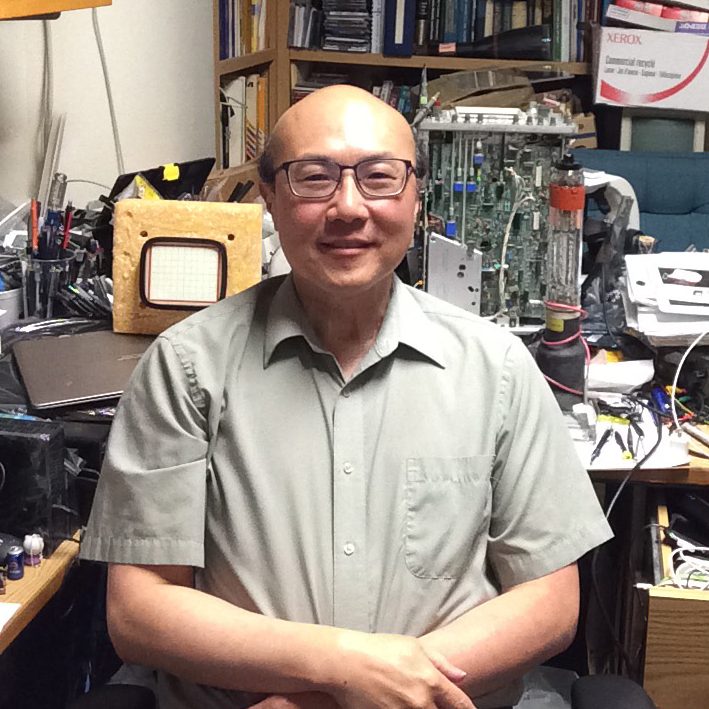Podcast: Play in new window | Download
Subscribe: Apple Podcasts | RSS

Welcome Dr Thomas (Tom) Lee of the Microwave Integrated Circuits Lab (SMIrC) at Stanford University!
This episode is sponsored by Rohde and Schwarz. Check out AskAnEngineer.us for more info about their value line test equipment.
- Tom is friends with two past guests, Jeri Ellsworth and Kent Lundberg
- Tom owns a LOT of scopes (200 or so)
- First scope was a Heathkit
- The Tek 485 had nice user design
- “I didn’t like an intermediate layer.”
- John Addis and Wink Gross designed the important parts of the 485
- The 485 added a superfast square wave to the front panel important for calibrating a 350 MHz scope
- Protection circuits
- Tom got started in electronics fixing TVs
- He then went to work for the founders of Wavetek (but not directly for the company) with people like Joe Deavenport
- Tom went to MIT and worked under Jim Roberge (check out the video series where Jim is lecturing on-camera)
- He proposed a thesis that was the world’s first integrated CMOS radio
- Marvin Minsky
- “The thesis doesn’t change the world…it changes you”
- CMOS was considered crap, was mostly used for wristwatches and calculators
- Other types of MOS and BJT circuits were considered to be much better.
- Tom used MOSIS, the IC bundling service mentioned on this program before.
- Didn’t have PDKs
- Magic from Berkeley allowed Tom to see the DRC errors as they happened.
- He ended up building an FM radio…without any inductors!
- Made gyrators into inductors
- Moved to Analog Devices where he learned a lot from Barrie Gilbert and Paul Brokaw
- Moving back to California and went to work for a startup RAMBUS
- Stanford wanted someone to do RF and give a first class on RF chip design
- Tom started in 1994 and started the first microwave IC lab.
- Tom and his grad students created the first GPS CMOS receiver
- Used to be 1 GHz and above is microwave
- Many of Tom’s students are (truly) seeing Maxwell’s equations for real for the first time
- What are the mental models?
- Tom said he “inflicts history on students”. This is also in the early chapters of Tom’s book, Planar Microwave Engineering
- Maxwell didn’t use vector calculus, he used quaternian form.
- Every course Tom teaches has a lab, including his undergrad lab which involves copper tape and making a radio.
- A lot of faculty have never built stuff
- He is now working with students on mmwave and 5G (because that’s where a lot of the research dollars are right now)
- Beamforming to get aggregate bandwidth
- Printed electronics for power delivery, serving devices that are in the mW level not the W level
- Feature sizes of CMOS
- Tom is on the board of Xilinx
- Tom is taking a year sabbatical and working on a book about instrumentation
- He hopes to ask many of the creators about the secrets inside the test equipment he often is reverse engineering
- Jim Williams told him to buy a rubidium clock (standard) at a flea market.
- Worked at DARPA, where his office funded development of a chip scale atomic clock
- That chip subsequently released a bit of smoke in the space station…
- Read more about Tom’s research on his group’s website

Great interview with a great man! I took a few courses for Tom when I was at Stanford in the mid nineties and he is the best professor I have had. Pedagogical, knowledgeable and very inspiring. And with a great sense of humor. Thanks Tom! And thanks Chris for this interview and all other episodes of The Amp Hour.
Thoroughly enjoyed this one Chris and Tom! Tom’s laugh is so contagious. Love how he doesn’t take himself so seriously, but clearly knows what he’s doing. Thanks!
Really good interview, enjoyed listening to you two. The book sounds like the various writings of Bob Pease, looking forward to it, its nice to learn about why certain stuff is done its way and all the history that belongs to it.
And you almost got to the point of discussing what the future will bring us in terms of weather technology is good or bad, and bad in a sense of do we really need all that 5G communications stuff, isnt enough data already transmitted all the time troughout this world.
I would really be keen on listening on those topics from Tom´s perspective, as he said there are a lot of things to come in IoT and so on.
Would he be arguing for those kind of technologies, since his work is kind of dependend on those future technologies to thrive, or is he rather critical, since it simply doesnt help society as a whole.
Awesome interview… Quality throughout!